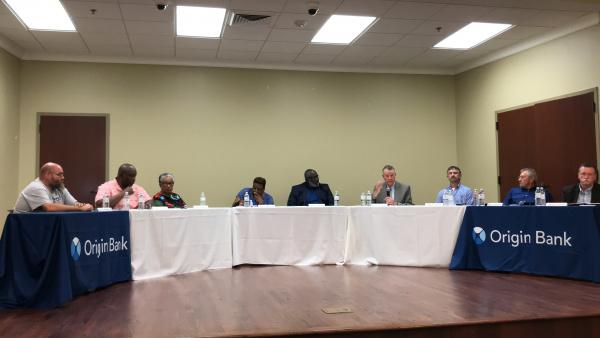RDL forum: How to work together

Leader photo by Caleb Daniel From left to right, Will Edwards, Greg “Big Coach Williams, Theresa Wyatt, Karen Ludley, Tommie Woods, Richard Durrett, Dan Lord, Glenn Scriber and John Cole appeared at Thursday’s Lincoln Parish Police Jury candidate forum held by the Ruston Daily Leader.
Editor’s note: This is the first of a series examining candidates’ answers to questions posed at Thursday’s election forum.
As the public asked nine candidates for Lincoln Parish Police Jury about topics that have divided the current jury, working together was a common refrain among the answers at the Ruston Daily Leader’s first election forum Thursday.
Candidates for District 1, 2, 3 and 6 said the phrases “work together,” “come together,” and “get together” 35 times as they answered constituents’ questions throughout the evening, but specifics on how the jury could do that were, at times, sparse.
Each candidate on the ballot in those districts and roughly 80 residents attended the first of two meet-and-greet, question-and-answer events at the Lincoln Parish Library Events Center. Candidates from Districts 9, 10 and 11 will follow suit on Tuesday, beginning at 5:30 p.m.
Would-be jurors answered questions selected from those written by attendees.
At the close of a four-year jury term marked by a handful of high-profile disagreements that have at times seen jurors pitted against each other, one audience question explicitly asked candidates how they would “span the divide” that appears to exist within the jury.
But other questions on topics that have split the jury — such as ambulance service and evaluating the parish administrator — also drew an emphasis on working together from the candidate field, even amidst a few disagreements.
Ambulance service
After the nearly year-long process the jury underwent in 2022 to research and select a provider for emergency medical and rescue services for parish residents, it was clear several challengers made that issue a cornerstone of their platform.
The Leader’s extensive coverage of that process can be found at rustonleader.com/ tags/ ambulance- service, particularly the story titled “Ruston it is.”
Jurors ultimately chose Ruston on a split vote, rather than a combination of Pafford EMS for EMS and the Lincoln Parish Fire Protection District No. 1 for rescue.
Thursday, candidates were asked whether that was the right choice.
Four of the six newcomers on stage agreed with the jury’s decision: Greg “ Big Coach” Williams in District 1, Tommie Woods in District 2, Dan Lord in District 3 and John Cole in District 6.
District 1’s Will Edwards, a volunteer firefighter for the parish department, said that department could have handled the task if they had been selected.
Karen Ludley of District 2 declined to answer the question, saying she didn’t know enough about it.
All three incumbents on the stage — District 1’s Theresa Wyatt, District 3’s Richard Durrett and District 6’s Glenn Scriber — defended their votes, with Wyatt and Durrett opposing the Ruston contract and Scriber supporting it.
Williams was the only challenger to overtly criticize an opponent Thursday, saying he disagreed with Wyatt’s vote against the ambulance contract. At the time she said she was concerned about where the funds would come from.
“If I don’t have any money in my house, I’m going to pay the light bill,” Williams said. “Some things you’ve got to have.”
Wyatt, as well as Durrett, said they thought the other ambulance option would have been better for their rural districts, and they wanted to see more investment in the parish fire department.
“I think that the price we were paying, or are paying, could be better served if we would strengthen the rural fire department,” Wyatt said. “I’m not sorry I made that decision.”
Woods had a 35-year career with the RFD, a fact he repeatedly touted in the forum, saying this topic inspired him to run.
“I’d put Ruston Fire Department up against anybody,” he said. “I’m one of the 36 paramedics we had when I was there. Who do you want in your home to see about you, a paramedic, or do you want an (Emergency Medical Responder)? These are things we need for our people in the parish.”
Cole said signing with Ruston was “probably the right choice” when considering cost and quality of service.
Lord cited his five years of experience with the RFD and said all jurors should have been included from the beginning of negotiations, rather than a “ backdoor policy” that led to a “transparency problem.”
The question is still relevant for the upcoming jury because the contract with RFD extends through 2027 — the last year of the next jury term.
So the next batch of jurors will likely revisit the ambulance topic ahead of that deadline.
Administrator issues
Another question asked candidates how they believe the jury should handle performance issues with its administrator — the lead staffer that oversees the other 150 parish employees.
The clear context: In January the jury fired then-administrator Doug Postel on a split vote after two and a half years on the job, after at least one juror previously asked him to resign or they would terminate him.
The jurors’ issues with Postel haven’t come to light. Find more coverage in a freeto- read article titled “Doug Postel out as parish administrator” at rustonleader.com or in the Jan. 12 edition.
Durrett cited his own experience as administrator for 17 years.
“I know in the 17 years, you know each juror, you work with each juror, you know if they think you’re doing a good job or not,” he said. “They don’t have to come tell you what you’re doing wrong.”
He pointed to the fact that administrator is an at-will employment position with a one-year contract.
“(The jury) can terminate you for no reason after that year, or the next year or next year,” Durrett said.
Scriber disagreed. “To sit here and say we can terminate someone without just cause — I’m absolutely, positively against that,” he said. “I don’t think that’s fair to anyone involved. If they have failed their duties, what they are hired to do, then I will be the first to step up and address that issue. But we’ve got to do it in the proper way.”
Wyatt said the jury handled the Postel situation well, in a way that “could be used as a model.” She also said the jury should offer the employee the choice to discuss his issues in executive session — a private part of an otherwise public meeting.
That was discussed at the meeting in which Postel was dismissed, but the jury hadn’t followed the procedures prior to the meeting that make executive session legal.
Most of the newcomers said the administrator should receive regular feedback from jurors.
“Together” was a common sentiment in this question, as challengers said each juror needs to play a part.
Ludley, a former teacher, cited the school model where a principal observes the educators and gives them feedback.
“That’s what I feel like we should be doing with the administrator of the police jury,” she said. “Whatever job they were doing, it should be evaluated by the 12 ( jurors). Let he or she know what is wrong, what is not wrong. We can’t just let people go because they do one little thing wrong. But we have to give them an opportunity to make corrections.”
Woods also recommended evaluations, followed by an investigation, if needed, that should rely on hard evidence.
Williams pointed to evaluation policies, saying the jury should make sure they have those updated and abide by them.
Edwards said he wasn’t sure, but suggested all jurors should meet to figure it out.
Lord said the jury should have an evaluation committee to give feedback to employees. He also said jurors should be held accountable for how they handle employee issues.
“You’re going to evaluate them, and you’re going to give them a reason of what their production is and what they’re doing or not doing,” he said. “ I worked at the Ruston Fire Department, and every quarter, we had an evaluation. This is what needs to happen to handle performance issues with the administrator.”
Citing his extensive history in banking, Cole said the jury must keep employment laws in mind, and the best way to do that is to have a detailed evaluation policy that keeps the jury from handling issues on a whim.
“If you’re working within a predisposed evaluation process and everybody understands what your expectations are, then you have a better opportunity to deal with problems,” he said.
The jury divide
The second question of the night asked candidates how the jury can close the divide among them.
Cole said the jury needs better open communication among all members.
“There’s separate conversations going on over here, and a decision’s being made, and another conversation’s being had over here, and there’s no communication between the people in the conversations,” he said.
“Some people are on a certain type of agenda to get something done, and there’s no communication to say, ‘Well, I need help from District 6 so I can get something done in District 12. I don’t see a lot of that in what I’ve seen.”
Lord, Durrett, Woods and Ludley each said one key would be communicating with constituents.
“We want you to see your tax dollars at work,” Woods said. “You shouldn’t have to pay your tax dollars and not getting anything that you need, not getting your roads fixed, not getting animal control. This is something the jury is going to have to work together to get this solved.”
Ludley also said she believes so many candidates are running because “we see the division.”
Scriber said the jury needs strong leadership in order to work together.
“You’ve got to have strong leaders that people believe in, that people have confidence in, that people can put their trust in,” he said. “When you have that, it’ll spill over into the jury itself. We’ve got to have people… who are not afraid to make the tough decisions that need to be made. And those decisions can be made, as long as it’s done right.”
Wyatt said she believes the root of the jury’s rift is a “generational divide.”
“We’re going to have to respect age, and we have to respect youth,” she said.
Williams said the parish is “still playing with the race thing.” He cited his coaching and education experience in both Grambling and Ruston, saying he’s a candidate who can span the cultural divide.
In an overall quiet showing between two forums, Edwards has repeatedly emphasized getting back to basics and being a unified community.
“I do believe in working together, communication, and getting back as one as a community,” he said. “All of us can do this. We all can work together, some of us old, some of us younger it don’t matter. We can all get back to being one as a community.”

